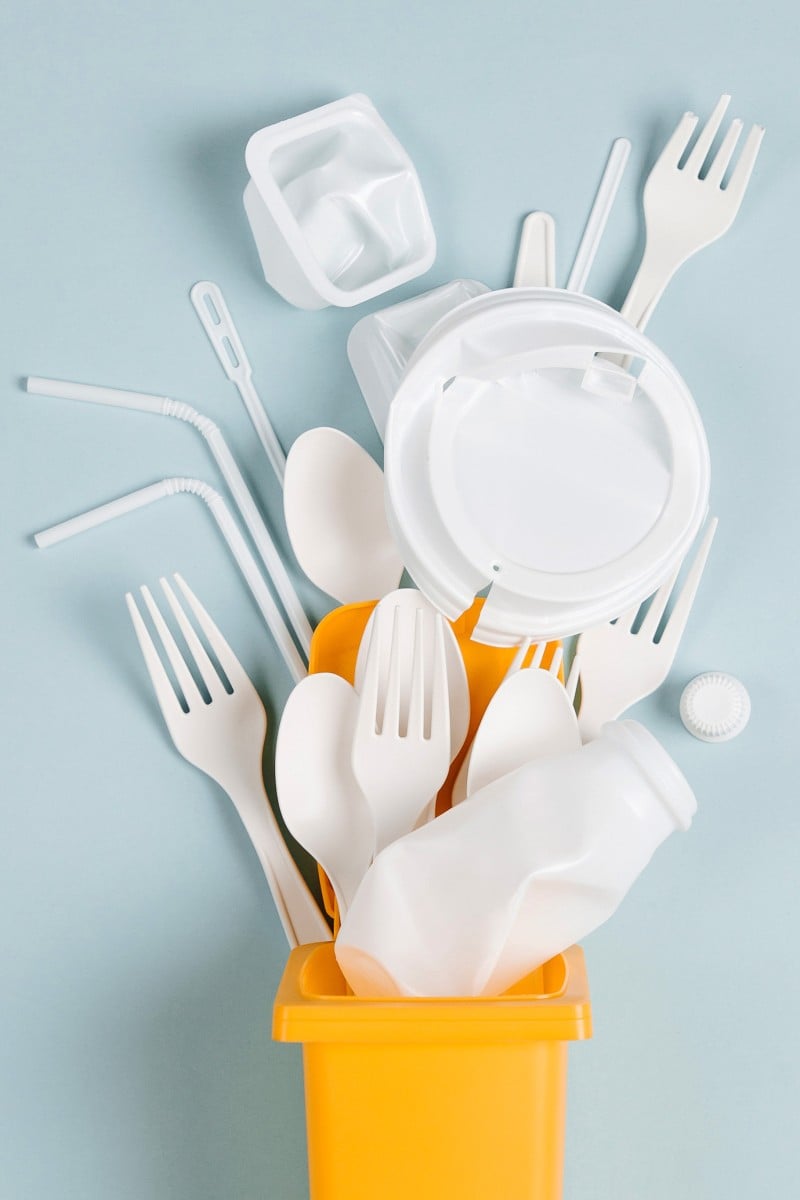
Face Off: Should Hong Kong ban single-use plastic tableware?
- Each week, two of our readers debate a hot topic in a showdown that doesn’t necessarily reflect their personal viewpoints
- This round, they discuss whether the city should ban one-off plastic utensils
 What are your thoughts on single-use plastics? Photo: Shutterstock
What are your thoughts on single-use plastics? Photo: ShutterstockIf you are interested in joining future Face Off debates, fill out this form to submit your application.
For: Chelsea Chen, 14, St Paul’s Co-educational College
The use of plastic tableware has increased exponentially in Hong Kong over the past three years because of Covid-19. This has been terrible for the environment, as it takes hundreds of years for plastic to decompose and it releases immense amounts of greenhouse gas. To keep the situation from getting worse, the government should take action and ban single-use plastic tableware.
Banning plastic utensils would significantly reduce the amount of plastic waste in the city. A survey conducted by Greeners Action in 2020 found that the amount of single-use plastic tableware in Hong Kong surpassed 100 million pieces every week during the pandemic. Plastic waste has taken a toll on the city’s landfills, and soon, the government may have to construct more landfills to deal with the vast amount of rubbish.
Is the HK$1 plastic bag fee an effective way to reduce waste in Hong Kong?
Plastic waste is the most abundant type of litter found in the ocean, according to the International Union for Conservation of Nature (IUCN). This waste gets broken down into tiny bits called microplastics, small enough for birds, turtles and other marine life to ingest. As a result, they may die of starvation, with stomachs full of plastic.
Microplastics can affect the health of human beings too. According to the IUCN, “Microplastics have been found in tap water, beer, salt and are present in all samples collected in the world’s oceans. Several chemicals used in the production of plastic materials are known to be carcinogenic and interfere with the body’s endocrine system, causing developmental, reproductive, neurological, and immune disorders in humans and wildlife.”
Some argue that single-use plastic tableware is more convenient for occasions such as family gatherings, as washing many utensils may burden hosts. However, there are many recyclable alternatives made from things like paper and sugarcane. These substitutes would be handy for party throwers and help save the environment.
The amount of plastic waste in Hong Kong is shocking. We must act now to save the environment and protect our beautiful city.
Hong Kong’s Repair Cafe helps people save money while working for the environment
Against: Matthew Wong Hong-yu, 16, Shung Tak Catholic English College
Single-use plastic tableware has been blamed for many environmental problems, so much so that it has been suggested it should be banned in Hong Kong. However, this logic is flimsy, if not heavily flawed: banning single-use tableware will not ease the environmental problems our city is facing.
First and foremost, plastic tableware is actually more eco-friendly than other alternatives. Plastic consumer goods like straws, utensils, and styrofoam cups are less energy intensive than alternatives like paper or aluminium, which use more resources, create more waste, and produce more pollution than one-off plastic items.
According to the World Economic Forum, “study after study shows that paper bags have a much higher carbon footprint than conventional plastic shopping bags.” While research concluded that paper bags do contribute less to the impacts of littering, in most cases, “they are significantly worse when it comes to climate impacts ... compared to single-use plastic bags.”
Plastic tableware is more economical compared to reusable utensils made from other materials. Since it is less costly to produce than paper or aluminium alternatives, it is also cheaper for consumers.
Trying to be more environmentally friendly can be expensive – you could empty your pockets trying to sustain an eco-friendly lifestyle, and this is simply not accessible for everyone. Not every household in Hong Kong can afford the extra expense of green tableware, so it would be unwise to use a “one-size-fits-all” approach by eliminating plastic utensils.
Finally, the government needs to do more than just ban one-off plastic cutlery to get to the root of the problem, which is more about subpar disposal practices. These practices include littering and uncontrolled or poorly supervised landfills. These are problems that have yet to be solved – the landfills in our city are always full, and Hong Kong has not maximised its potential when it comes to plastic recycling.
It doesn’t make sense to ban single-use plastics; it is simply a distraction that doesn’t get to the core of the city’s plastic waste problem.
